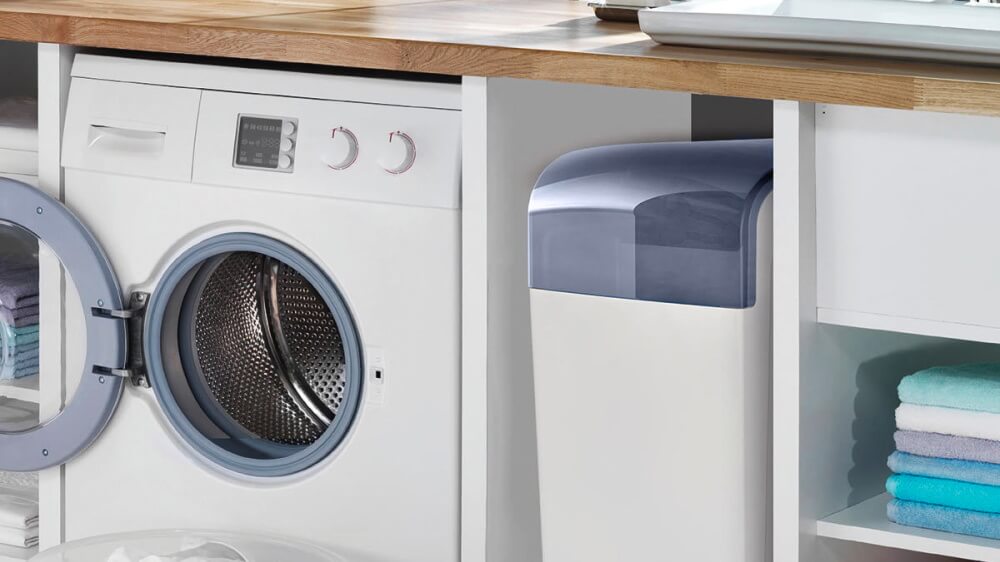Are you wasting hundreds of pounds every year on cleaning products, energy bills, and appliance repairs due to limescale? If so, you’re not the only one. An estimated 16 million households in the UK live with hard water and, while it is perfectly safe to drink, it causes all kinds of problems in the home due to the limescale that it creates.
If you are considering installing a water softener to tackle your hard water problems, keep reading. In this comprehensive guide, we’ll cover the real cost of hard water in the UK, and highlight the savings that you can make with a home water softener system.
What Is Hard Water & How Is It Formed?
We’ve all heard the term ‘hard water’ but what is it and, how is it formed? Allow us to explain. Rainwater is naturally soft when it falls, but as it penetrates the earth to underground aquifers or reservoirs, it passes through limestone, sandstone, and chalk, and absorbs some of the minerals that these sedimentary rocks contain.
These minerals, predominantly calcium carbonates and magnesium ions, dissolve in the rainwater as it makes its way below ground and makes it hard. In short, hard water is mineral-rich water, and the more sedimentary rocks it passes through, the harder it is.
Due to the geological makeup of the South and East of England, hard water is a problem. Homeowners in Bedfordshire, Sussex, Cambridgeshire, Hertfordshire, and Surrey live with hard to very-hard water every day, with the county of Suffolk being the most adversely impacted of all. High levels of limestone and chalk in this part of the country are to blame, with many regions experiencing calcium carbonate levels of more than 300 mg/l.
Is Hard Water Bad For You?
Hard water is not a health hazard, and it is safe for drinking, showering, and cooking. In fact, a report by the National Research Council suggests that as it contains calcium and magnesium, minerals essential to health, it could be good for you. It is ‘mineral water’ after all. However, it can cause all kinds of problems with the skin and hair.
Limescale-rich water strips natural moisture from the hair to leave it feeling dry, coarse, and lacklustre. It can lead to a flaky scalp, and as it doesn’t lather like soft water, it can prevent your shampoo from working efficiently.
Hard water has a similar drying effect on the skin and can worsen common conditions such as eczema, acne, psoriasis, and clogged pores. Its mineral-rich content can leave skin feeling dry, itchy, and irritated while dulling a bright complexion.
The Damaging Effects Of Hard Water In The Home
In addition to being bad for the skin and hair, hard water can be extremely damaging in the home, causing all kinds of problems with household appliances, plumbing systems, and bathroom fixtures such as taps and showerheads.
Limescale builds up quickly, and if you live in an area with very hard water, it can block kettle filters in just a few days. Its chalky residue plays havoc with heating elements and can clog water pipes to render washing machines and dishwashers useless. It can also damage boilers, radiators, and heating systems – leading to costly repairs.
Mineral-rich water coats shower screens, sinks, and bathtubs with limescale residue making them more challenging to clean, and as it doesn’t foam well, it can make cleaning detergents less effective. It can leave your dishes can glassware streaky and stained, and it can damage clothing fibres in the wash. Hard water can be a real pain to live with, and it could be costing you a fortune every year.
The Real Cost of Limescale On The Home
So what are the reals costs of hard water on the home? While some things are highly-visible, such as clogged showerheads and white flakes in your coffee, others are not. Here we list the hidden costs caused by limescale in the home:
1. Increased Energy Bills: Your boiler, central heating system, washing machine, dishwasher, and kettle all work less-effectively when lined with limescale, and this could increase your household utility bills by as much as 40 per cent.
2. Plumbing Maintenance: Unseen limescale deposits can clog pipes and corrode pumps, and lead to additional plumbing maintenance each year. According to checkatrade.com, the average plumber cost is £50 per hour in the UK – and this can soon mount up if you need to call them out several times a year.
3. Appliance Repairs & Replacements: If left untreated, limescale can shorten the lifespan of your household appliances and make them more than 20 per cent less efficient. You’ll have to repair and replace them more often, and we all know how much a good washing machine costs these days.
4. More Cleaning Product Costs: As we mentioned previously, hard water doesn’t lather or foam well (due to its high mineral content), and as such, cleaning detergents do not work as well as they should. You’ll need to use more soap and detergents to get your laundry and dishes clean, and you’ll need to buy more anti-limescale products to keep toilet, sinks, showerheads, and bathtub clean. It is another expense caused by hard water and one that can add up significantly over a year.
How A Water Softener Can Save You Money
Fortunately, there is a way to overcome the challenges of hard water in the home, and that is by installing a water softener. A filtration system, scientifically engineered to remove high concentrations of magnesium and calcium from your incoming water supply, it's an investment for any hard water home.
With a water softener system, you can save money on your heating bills, extend the lifespan of your electrical appliances, and cut cleaning product costs with a limescale-free kitchen and bathroom. It will make a vast difference to your skin and hair too, so why not request a free quote today.
